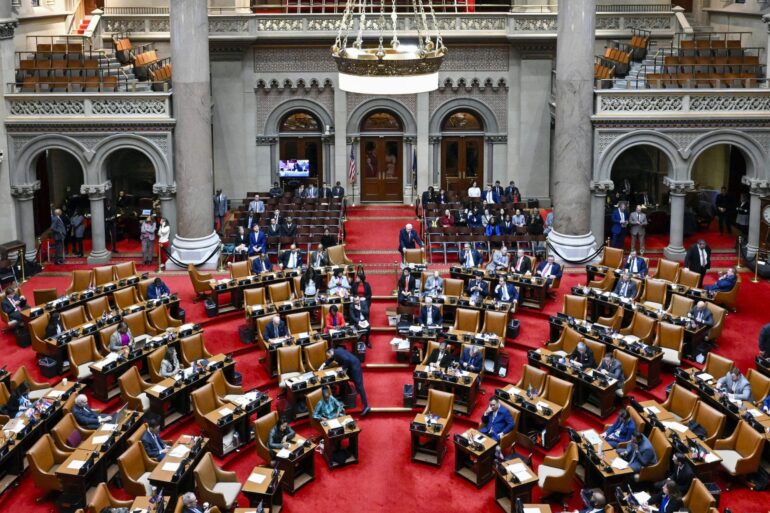🔴 Website 👉 https://u-s-news.com/
Telegram 👉 https://t.me/usnewscom_channel
New York has a $237 billion state budget, three weeks late.
Lawmakers added $4 billion in spending above the $233 billion Gov. Hochul proposed in January, and everyone packed the budget with all sorts of non-budgetary stuff, as usual.
But at the last minute, lawmakers ditched one Hochul proposal critical to small businesses: change a long-dormant state law that’s suddenly forcing companies to pay years’ worth of extra back wages to workers.
It may be obscure, but it’s an apt illustration of Albany’s dysfunction.
In 1890, lawmakers decreed that mining, manufacturing, “mercantile” and other companies should pay manual laborers every week.
The purpose, as the Legislature reiterated nearly a half-century later, was to protect workers from companies that would disappear before paying out any wages.
Until recently, most modern-day businesses — think retailers, not quarries — didn’t think this law applied to them and paid their workers biweekly.
But in 2019, an appeals court ruled that individuals, not just state regulators, could bring cases, finding a construction firm had violated the law in paying every two weeks.
The consequences the court decreed were startling: It ruled the construction firm would have to pay 100% of the “late” wages in damages.
That is, for every other week the worker was paid a week “late,” under this interpretation, the worker would get an extra paycheck.
And it turns out lots of workers suddenly fall under the definition of physical laborer: people who stand up a quarter of the time and are paid less than $900 weekly.
Since workers can claim six years of damages, that’s a lot of money — retroactively increasing payroll costs for lower-wage workers by 50%.
Trial lawyers have filed hundreds of lawsuits.
Defendants have ranged from Victoria’s Secret to Bed Bath & Beyond, Duane Reade to Petco, doctors’ offices to ice-cream stands.
The situation got murkier this year when a different appeals court ruled in a different suit, involving a Queens airline-support company, that workers couldn’t bring such cases.
The state’s top court must resolve it, but that could take years.
The problem is the law’s ambiguity — and so in January, Hochul attempted to clarify.
Her budget proposal would have tweaked the law to eliminate the damages provision in cases “where the employee was paid in accordance with the agreed terms of employment,” that is, being paid every other week.
It was a pragmatic compromise: She didn’t propose to gut the underlying law, requiring weekly payment for manual workers.
And she was open to even more compromise, discussing ways to approach the problem with lawmakers during budget season.
Yet last week, Sen. Jessica Ramos (D-Queens) abruptly killed any deal.
Ramos made straw-man arguments, telling New York Focus that “it’s disappointing to see the governor’s insistence on defending multinational corporations that want to displace workers” and “disappointing that such consequential labor law is being negotiated in the dark.”
In fact, companies facing disproportionate penalties here are the smaller businesses, not big ones.
As for whether it’s good to negotiate “in the dark,” no, it’s not.
By that logic, Ramos shouldn’t support anything in the budget, as the entire document is negotiated in the dark, at the last minute, with no public hearings or testimony on critical last-minute changes.
If Ramos didn’t want to do this the “wrong” way, in the state budget, fine — she should do it the right way.
As the labor committee chair, she should convene hearings, inviting everyone with an interest — companies large and small, trial-lawyer firms, supposedly harmed workers — to testify.
This is a straightforward matter: What is the purpose of this law today?
Is it to mandate weekly wage payments for people who do some physical labor?
Or is to protect employees from fly-by-night companies that might vanish without paying wages at all, the original purpose?
If the law’s purpose has changed, why not change the law to explicitly require weekly pay for everyone paid hourly in the future, rather than leave it up to trial lawyers to select for the most lucrative past cases?
And fix it by June, the end of the session.
Otherwise, more businesses will have to pay out on old claims, sacrificing future growth — and future ability to hire people — to pay massive penalties for past behavior that didn’t harm anyone.
Nicole Gelinas is a contributing editor to the Manhattan Institute’s City Journal.

